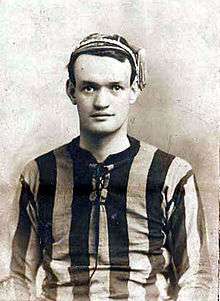Patrick O’Connell was born in north Dublin in 1887. From the age of 14, he worked at Boland’s Mill and became a foreman at the age of 15. He played junior football with several local Dublin clubs, including Frankfort and Stranville Rovers. In 1914, O’Connell captained Ireland, playing with a broken arm, as a ten-man Irish team clinched the title of the 1914 British Home championship with a 1–1 draw against Scotland at Windsor Park. He made his last appearance for Ireland in a 1919 Victory international against Scotland.
O’Connell had a successful playing career, starting out as a professional with Belfast Celtic in Northern Ireland. After getting spotted for his strong performances as a central defender on the Emerald Isle, he went on to have a successful career in England, lining out for Sheffield Wednesday, Hull City and Manchester United, where he was captain at the time of the 1914-18 war. He has the distinction of being the first player from the Republic of Ireland to play for Manchester United.
On his retirement from playing, O’Connell became a successful manager with Ashington, in the northeast of England but then left his family in 1922 to work in Spain. He started out as manager of Racing Santander, guiding the club to promotion to Spain’s top flight in 1929. He would later return to Racing for a second spell as manager between 1948 and 1949. After Santander, he moved west to manage Real Oviedo, leading the Asturian club to promotion to the Spanish First Division.
His two most successful managerial spells came at Real Betis and then at FC Barcelona. In the 1934-35 season, ‘Don Patricio’, as he was affectionately known, led Betis to their only ever La Liga title success. Betis won the title on April 28, 1935 – winning 5-0 against O’Connell’s former team Racing Santander, in Santander and finishing a point ahead of Real Madrid. The Irishman’s achievements in Seville attracted attention from Barcelona.
Barcelona appointed O’Connell for the 1935-36 season. At the outbreak of the Spanish Civil War in 1936, the president of Barcelona, Josep Sunyol, was assassinated, leaving the Catalan club in crisis. Barcelona couldn’t afford to pay O’Connell’s wages but he was determined to bring some stability to the club. In 1937, the club was offered the chance to raise funds, when Catalan businessman Manuel Mas Soriano – who had moved to Mexico – asked the club to tour North America.
O’Connell sailed with his team on a four-month fundraising tour to Mexico, Cuba and the USA, where they played 10 exhibition matches. The money raised abroad ensured the club’s survival and only for the Irish visionary, FC Barcelona wouldn’t exist today.
During the 1936-37 season, La Liga was suspended because of the Spanish Civil War. Domestic success was achieved, however. Barça won the Liga Mediterránea in 1937, a year after finishing runner-ups in the Campeonato de Catalunya. O’Connell went on to manage Betis’ cross-city rivals Sevilla between 1942 and 1945. During his first season in charge, he guided the club to second place in La Liga.
The Dubliner was credited with bringing Spanish football to a new level. “It must be said I like to consider I have made no little mark on the world of football in Spain. It is not excessive of me to say that football in this country would not be where it is today without my contribution,” O’Connell said before his death.
Football managers in Spain are known as el ‘míster’ – it is said that this came about in honour of Patrick O’Connell, so great was his influence on the sport. El ‘míster’ has been adopted by players and staff alike, to address head coaches across the Iberian peninsula. O’Connell was rarely seen without a trilby and was known for taking part in training sessions with his squads, at a time when it was a new concept at training grounds.
Spanish football historian Alfonso del Castillo describes O’Connell’s football philosophy. “He always said that football had to be played with speed, with quick transitions from defence to attack and to be resolute.”
Having spent most of his life in the delightful Andalusian city of Seville, he left Spain in 1954 after a long and illustrious career. He moved to London, where one of his brothers kept a small hotel. Patrick died in poverty in 1959 at the age of 71, just 19 years after leaving Barcelona. His brother Larry was the only person to attend his funeral. He lay in an unmarked grave for 57 years. The grave has since been restored through the efforts of an international campaign to resurrect the memory of the former Manchester United captain who saved Barcelona from extinction.
His life and career were sadly forgotten about until Sue O’Connell decided to write a book. This book brought an incredible story into the spotlight, which inspired the founding of the Patrick O’Connell Memorial Fund. A quartet of football fans, Fergus Dowd, Alan McLean, Simon Needham and Maureen O’Sullivan, helped renew interest in the extraordinary life of Patrick O’Connell in recent years, ensuring his grave in London was restored and his legacy revived.
Former Barcelona president Josep Maria Bartomeu welcomed Sue O’Connell to Camp Nou, along with her husband Mike, who is Patrick’s grandson. Sue wrote the book “The Man Who Saved FC Barcelona” in 2016.
Kieran Quaile | GSFN










